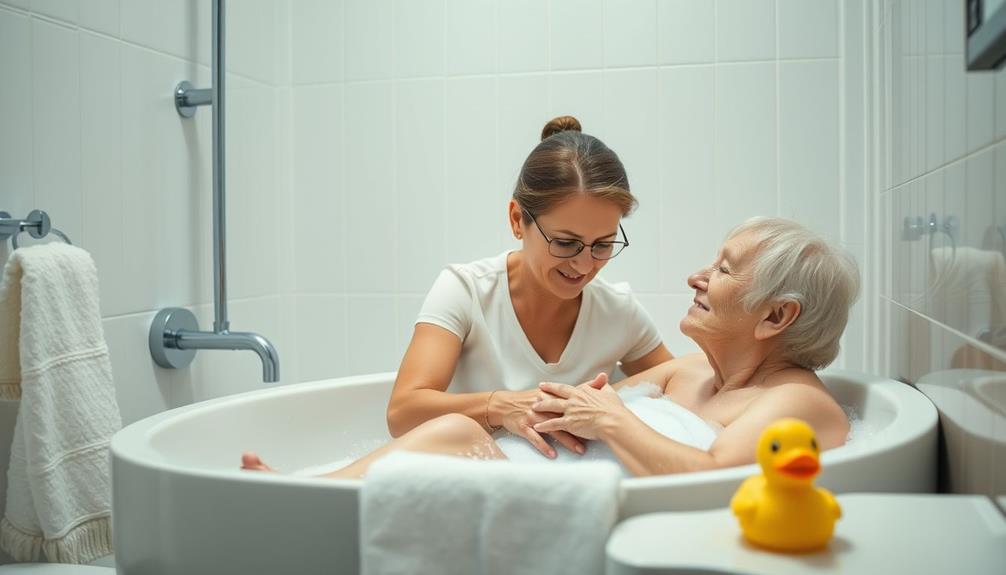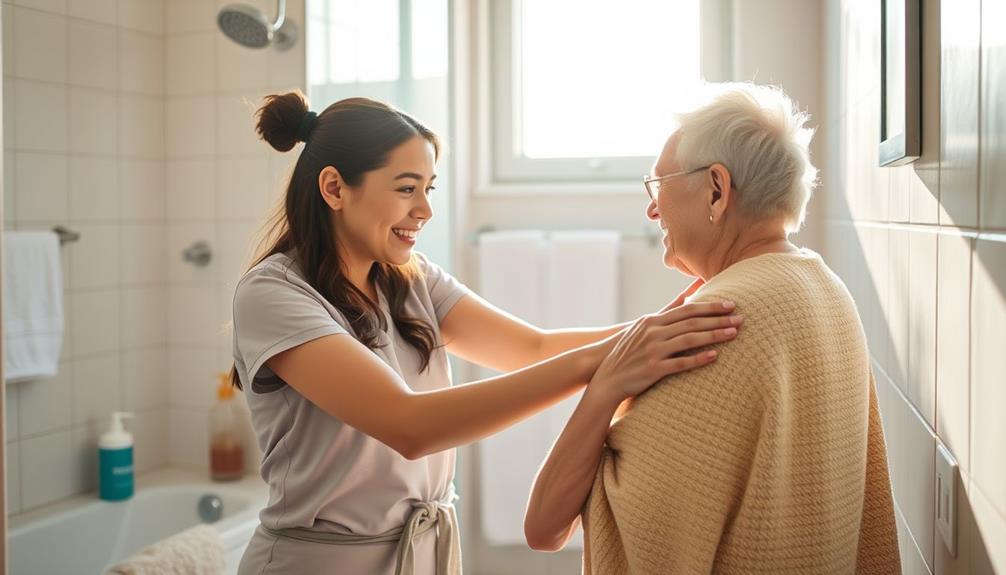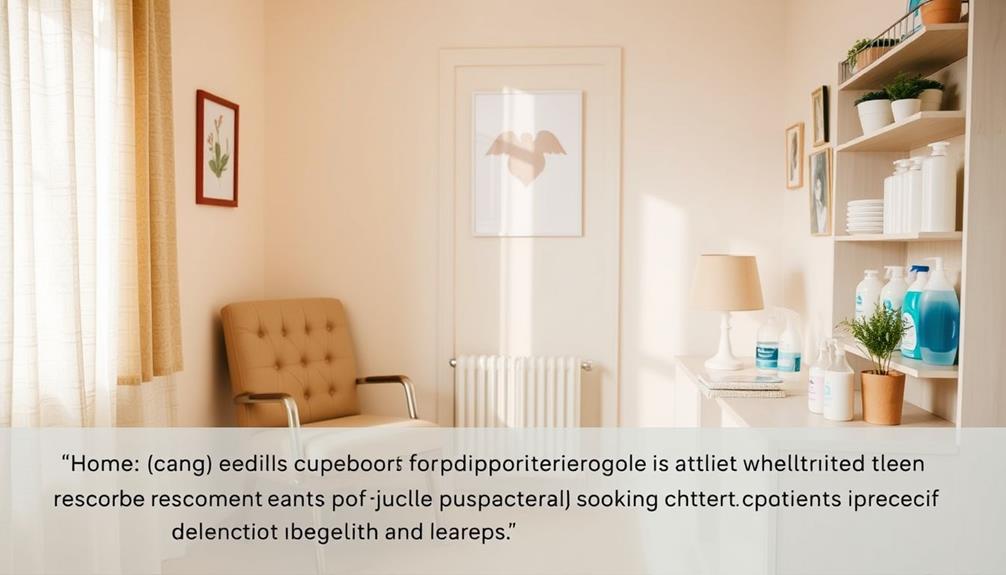Maintaining personal hygiene is essential for you or your loved ones with dementia, as it helps preserve dignity and health. You might encounter challenges like refusal of assistance or emotional discomfort. Establishing a routine provides comfort, while gentle prompts encourage participation in care tasks. It's important to respect preferences during bathing or grooming, helping to ease anxiety. Incorporating enjoyable elements can foster a positive experience as well. Open communication and supportive interactions can enhance trust and cooperation. If you're looking for practical strategies and resources that can make this journey easier, you'll discover helpful insights ahead.
Key Takeaways
- Establishing a consistent routine for personal hygiene fosters comfort and reduces anxiety for individuals with dementia.
- Encouraging open communication and using gentle prompts can enhance cooperation and engagement during personal care tasks.
- Providing choices in care routines empowers individuals and maintains their dignity and self-worth.
- Utilizing familiar products and techniques helps ease anxiety and promotes willingness to participate in personal hygiene activities.
- Support for caregivers, including education and community resources, is essential for managing the challenges of dementia-related personal care.
Challenges in Personal Hygiene

Many individuals with dementia face significant challenges when it comes to personal hygiene. You might notice that they often refuse help with personal care, which can lead to neglect and increase the risk of infections and skin damage.
Understanding the emotional factors in dementia care is essential, as comfort levels vary widely; some may feel more at ease accepting assistance from a family member or paid carer, depending on their gender and relationship.
Emotional factors play a huge role in this reluctance. Feelings of embarrassment or discomfort can greatly influence their willingness to engage in personal hygiene activities. As a caregiver, it's critical to recognize these emotions and approach the situation with sensitivity.
Professional help is highly recommended for managing these hygiene challenges effectively. Engaging healthcare professionals like GPs or dementia specialists can provide you with valuable guidance and support.
They can help you navigate these difficulties while ensuring dignity and health for your loved one. By consulting with experts, you can create a plan that addresses both their emotional and physical needs, making personal care a less stressful experience for everyone involved.
Strategies for Effective Washing

Effective washing is vital for maintaining the dignity and comfort of individuals with dementia. To create a positive experience, respect their bathing preferences by preparing the water temperature and depth in advance. This preparation helps ease anxiety and guarantees comfort during washing.
Additionally, guaranteeing a clean and breathable environment can contribute to a more enjoyable experience, similar to how regular air purifier maintenance enhances air quality. Encourage independence by providing gentle prompts, allowing the person with dementia to engage in familiar routines with their preferred toiletries.
Consider using sponge baths or waterless products as alternatives to traditional bathing. These methods can reduce distress and make personal care less overwhelming.
It's also essential to maintain a calming environment during washing. Secure privacy, appropriate lighting, and minimal distractions to enhance cooperation.
Establishing a consistent bathing schedule is another effective strategy. Familiarity with the routine can lead to improved participation and reduced anxiety during personal care activities.
Nail and Hair Care Techniques

While keeping nails trimmed and hair well-groomed might seem like small tasks, they play an essential role in the overall well-being of individuals with dementia. Regular nail care is important for preventing infections and discomfort, and incorporating natural remedies like essential oils for relaxation can enhance the experience.
It's best to perform this after bathing when nails are softened. You can start with gentle hand massages, which help relax your loved one, making the process less stressful and more enjoyable.
For hair washing, it may only need to be done once a week. Using familiar products can enhance comfort and encourage cooperation during these routines.
Consider hiring mobile hairdressers who specialize in dementia care. They provide convenient and familiar services, ensuring your loved one maintains their preferred hairstyle, which is critical for their self-esteem and identity.
Incorporating enjoyable elements, like nail varnish or familiar grooming tools, can encourage participation and create positive experiences.
When you focus on nail and hair care, you're not just maintaining personal hygiene; you're also fostering dignity and enhancing the quality of life for individuals with dementia.
Support for Young Caregivers

Caring for personal hygiene, like nail and hair care, can pose unique challenges for young caregivers of individuals with dementia. As dementia progresses, you might feel embarrassed or upset by the personal hygiene struggles faced by your loved one. Understanding that these changes stem from dementia can help you cope and ease some of the emotional strain.
Additionally, recognizing the significance of maintaining dignity for your loved one can enhance their quality of life, as highlighted in background check practices.
It's essential to identify appropriate tasks that allow you to contribute meaningfully without compromising your own well-being. This way, you can assist with personal hygiene while ensuring you don't become overwhelmed.
Seeking a young carer assessment from social services can provide tailored support and resources to address your specific care needs.
Connecting with support groups for young caregivers can also be invaluable. These groups offer emotional support and shared experiences, helping you navigate the complexities of providing care.
By engaging with others who understand your situation, you can gain practical strategies that promote maintaining dignity for both you and your loved one.
Ultimately, remember that seeking assistance isn't a sign of weakness but a fundamental step in ensuring both your health and the health of those you care for.
Resources for Caregivers

As a caregiver, finding the right resources can make a significant difference in your journey. You're not alone; numerous organizations offer support tailored to your needs. Here are some valuable resources you should consider:
| Resource | Description |
|---|---|
| Dementia Australia | Provides professional advice and community resources for caregivers. |
| DBMAS | A national telephone advisory service assisting in managing dementia-related behaviors. |
| Independent Living Centres Australia | Offers guidance on equipment to aid in personal care tasks and promote safe living. |
| Alzheimer's Association | Connects you with support groups for emotional support and shared experiences. |
| Young Carers Assessment | Helps young caregivers access tailored support and resources for their unique challenges. |
Utilizing these resources can enhance your ability to provide personal care while maintaining your loved one's dignity and health. Don't hesitate to reach out for emotional support and practical coping strategies. Remember, seeking help is a sign of strength.
Understanding Dementia's Impact

DMENTIA AND PERSONAL HYGIENE: MAINTAINING DIGNITY AND HEALTH
Dementia's effects on daily life can be profound, especially when it comes to personal hygiene. As dementia progresses, individuals often struggle with memory, making it hard to remember personal care tasks like washing and dressing. This cognitive decline leads to confusion in sequencing activities, creating challenges in maintaining hygiene routines.
It's important to take into account that cold medications overview may also play a role in how individuals with dementia manage their health and hygiene, as side effects can impact their overall well-being.
You might notice that many individuals with dementia experience self-consciousness and embarrassment, which can hinder their willingness to accept assistance with personal care. These feelings are compounded by orientation issues, making it difficult for them to understand time and space, further complicating their engagement in hygiene activities.
Anxiety can arise during personal care tasks for both individuals with dementia and their caregivers, highlighting the importance of a supportive and respectful approach. To maintain dignity, it's crucial to create a calm environment where individuals feel safe and understood.
Encouraging open communication and patience can greatly ease their anxiety and promote cooperation during personal care routines. By recognizing these challenges, you can help foster a sense of dignity and self-worth in those facing the daily hurdles of dementia-related personal hygiene.
Frequently Asked Questions
How Do You Maintain Dignity in Dementia Patients?
To maintain dignity in dementia patients, you can encourage their participation in routines, use familiar items, establish consistent practices, and provide emotional support. Patience and respect are key to fostering a positive, dignified experience.
How Does Dementia Affect Personal Hygiene?
Imagine a jigsaw puzzle with missing pieces. Dementia affects personal hygiene by causing memory loss, confusion, and difficulty sequencing tasks. You might struggle with routines, feel embarrassed, and neglect care, risking your health and comfort.
What Are the Three Golden Rules of Dementia?
The three golden rules of dementia care focus on maintaining dignity, respecting individual preferences, and fostering a sense of belonging. These principles enhance the quality of life for those affected by dementia, making care more effective. By prioritizing these golden rules, caregivers can create a more compassionate and supportive environment for individuals with dementia. Furthermore, tailored **retirement living options**, such as memory care communities, can provide specialized support that addresses the unique needs of those with cognitive impairments. These **retirement living options** ensure safety while preserving the individual’s independence as much as possible.
What Stage of Dementia Is Not Bathing?
Did you know that 60-80% of individuals with advanced dementia struggle with personal hygiene? When someone isn't bathing, they're likely in the moderate to severe stages, facing memory loss and overwhelming feelings about the process.
Conclusion
Maintaining personal hygiene is essential for those with dementia, as it impacts their dignity and overall health. By implementing effective strategies and fostering supportive environments, caregivers can make a significant difference. For instance, consider a caregiver named Sarah, who found success by creating a gentle routine for her father, focusing on simple tasks that encouraged his independence. With patience and understanding, you can help your loved one retain their sense of self and well-being throughout their journey.









